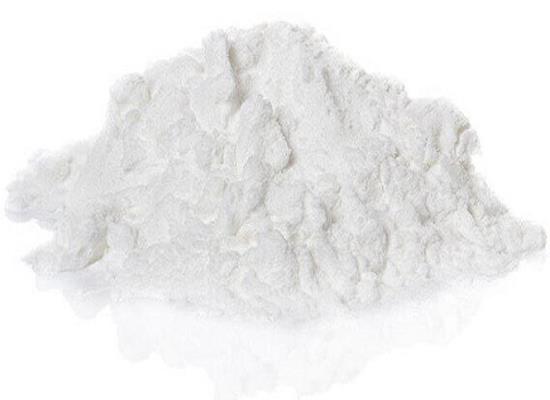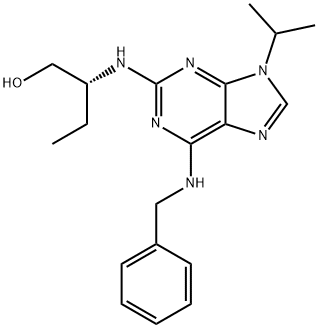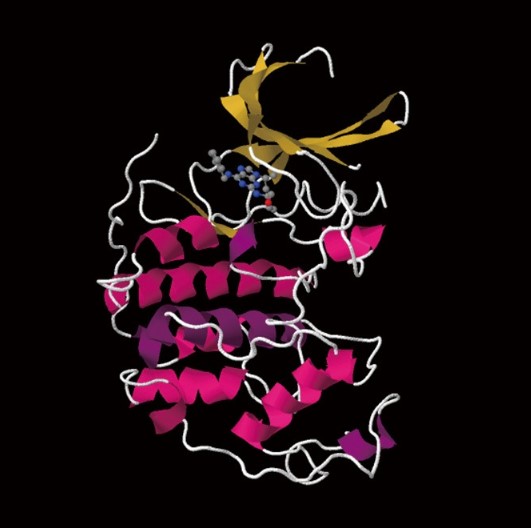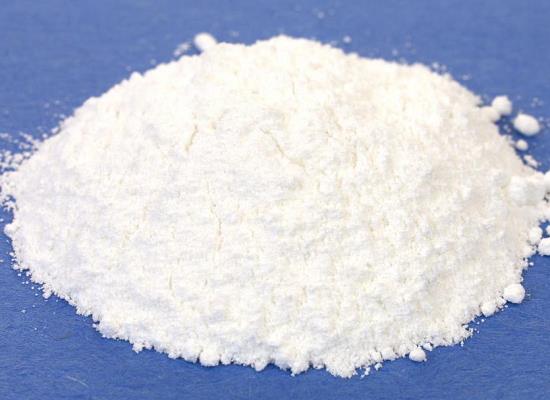Roscovitine: Overview and Preclinical Studies
General Description
Roscovitine, a potent CDK inhibitor, has been extensively studied in preclinical research for its potential in cancer and beyond. In cancer treatment, it induces cell cycle arrest and apoptosis in various cell lines, affecting multiple molecular pathways and demonstrating synergistic effects when combined with other anti-cancer agents. In xenograft models, it has shown significant antitumor effects across various cancer types, with substantial reductions in tumor growth rates. Beyond cancer, roscovitine has shown promise in treating kidney diseases, pain management, neurodegenerative conditions, and inflammatory disorders. Preclinical studies indicate its broad therapeutic potential, making it a promising candidate for further clinical development.

Figure 1. Roscovitine
Overview
Roscovitine, also known as (R)-Roscovitine, CY-202, and Seliciclib, is a potent inhibitor with a systematic name of (2R)-2-{[6-(Benzylamino)-9-isopropyl-9H-purin-2-yl] amino}-1-butanol. With a chemical formula of C19H26N6O and a molecular weight of 354.45, it presents as a white powder that exhibits solubility in DMSO (up to 50 mM) and in 50 mM HCl with the pH adjusted to 2.5. Belonging to the purine family, Roscovitine shares the fundamental ring structure found in biologically important molecules such as ATP, cyclic AMP, NAD, and FAD. Its mechanism of action involves competitive binding with ATP at the ATP-binding site of cyclin-dependent kinases (CDKs), hindering catalytic reactions. Specifically, Roscovitine inhibits CDK1, CDK2, CDK5, CDK7, and CDK9 (with IC50 values ranging from ~0.2-0.7 µM), while exhibiting poor inhibition towards CDK4, CDK6, and CDK8 (IC50 >100 µM). It also interacts with other kinases such as CaMK2, CK1α, CK1δ, DYRK1A, EPHB2, ERK1, ERK2, FAK, and IRAK4. Structurally, Roscovitine forms hydrogen bonds and interactions with CDKs and other kinases, as evidenced by cocrystallization studies. Notably, its cocrystal structures with CDKs have prompted further research into developing new CDK inhibitors or optimizing existing ones. Widely utilized in basic and disease research, Roscovitine has undergone testing in phase I and II clinical trials as both monotherapy and combination therapy for various human cancers. 1
Preclinical Studies
Cancer treatment
Roscovitine has been extensively studied in preclinical research for its potential in cancer treatment. In various cancer cell lines, roscovitine has been shown to induce cell cycle arrest and initiate apoptosis. By directly inhibiting CDKs, roscovitine halts the cell cycle progression at different phases, such as G0, G1, S, or G2/M, depending on the dosage, time, or cell line. Additionally, roscovitine affects several molecular pathways associated with CDK activity, including Ras-MAPK, NF-κB, p53, estrogen receptor, and JAK-STAT pathways. Moreover, roscovitine triggers apoptosis in cancer cells by downregulating anti-apoptotic proteins like Bcl-2, Mcl-1, survivin, and XIAP, while upregulating pro-apoptotic factors such as p53, p53AIP1, and Bcl-x. Studies have also shown that roscovitine exhibits synergistic effects when combined with other anti-cancer agents like doxorubicin, taxol, 5-fluorouracil, and cisplatin, among others. In cancer xenograft models, roscovitine has demonstrated significant antitumor effects across various cancer types, including colorectal cancer, uterine carcinoma, breast cancer, prostate cancer, osteosarcoma, and Ewing's sarcoma. These studies have shown substantial reductions in tumor growth rates, ranging from 45% to 80%, highlighting the potential of roscovitine as a promising candidate for further investigation in cancer therapy. 2
Other pathologies
Roscovitine is a potent inhibitor of cyclin-dependent kinases that has been extensively studied in preclinical research for its potential therapeutic applications beyond cancer treatment. In addition to its role in cancer, roscovitine has shown promise in the treatment of various other diseases in animal models. One area of investigation is kidney diseases, where roscovitine has demonstrated effectiveness in models of polycystic kidney disease and glomerulonephritis. In mouse models of polycystic kidney disease, roscovitine treatment led to a significant inhibition of disease progression, as evidenced by reduced kidney size, cystic volume, and blood urea nitrogen levels. In mouse models of systemic lupus and glomerulonephritis, roscovitine treatment improved survival rates, reduced proteinuria, and limited renal damage. Furthermore, roscovitine has shown potential in pain management, with studies in animal models demonstrating its ability to alleviate bone cancer pain and chronic neuropathic pain by modulating the expression of specific receptors involved in pain signaling pathways. Additionally, roscovitine has been investigated in neurodegenerative conditions such as glaucoma and retinal degeneration, where it has shown neuroprotective effects and reduced cell death in animal models. It has also exhibited anti-inflammatory properties in lung inflammation, protective effects against graft versus host disease, and preventive effects against radiation-induced salivary gland dysfunction. Overall, preclinical studies suggest that roscovitine has a broad range of potential therapeutic applications beyond cancer treatment, making it a promising candidate for further clinical development. 2
Reference
1. De Azevedo WF, Leclerc S, Meijer L, Havlicek L, Strnad M, Kim SH. Inhibition of cyclin-dependent kinases by purine analogues: crystal structure of human cdk2 complexed with roscovitine. Eur J Biochem. 1997; 243(1-2): 518-526.
2. Cicenas J, Kalyan K, Sorokinas A, et al. Roscovitine in cancer and other diseases. Ann Transl Med. 2015; 3(10): 135.
Related articles And Qustion
Lastest Price from Roscovitine manufacturers

US $15.00-10.00/KG2021-08-12
- CAS:
- 186692-46-6
- Min. Order:
- 1KG
- Purity:
- 99%+ HPLC
- Supply Ability:
- Monthly supply of 1 ton



